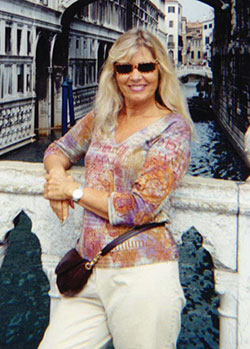Uterine Cancer Survivor
Twice blessed
Survivor strengthens her mission of patient advocacy after two cancer battles
 Fighting cancer is often a physical and emotional journey that doesn’t get any easier with practice, as two-time cancer survivor Colette Harp will tell you from experience. After recently completing chemotherapy for Stage IV uterine cancer, Colette Harp is cancer-free yet again—after surviving Stage II vaginal cancer. She’s been accumulating knowledge and experience and sharing that wisdom with other women who need to hear that she’s survived this deadly disease twice!
Fighting cancer is often a physical and emotional journey that doesn’t get any easier with practice, as two-time cancer survivor Colette Harp will tell you from experience. After recently completing chemotherapy for Stage IV uterine cancer, Colette Harp is cancer-free yet again—after surviving Stage II vaginal cancer. She’s been accumulating knowledge and experience and sharing that wisdom with other women who need to hear that she’s survived this deadly disease twice!
My grandson was 3 years old the first time I went through cancer, and my granddaughter wasn’t even born yet! I’m so very grateful I’m still on this planet, watching as my grandchildren turn into teenagers. My family gave me the will to live, and I’m grateful every day that I found the tools to make that possible.
When I was first diagnosed with vaginal cancer at age 58, I was heartbroken but hopeful because I was told the disease was slow-growing and easily treated. Doctors recommended intense radiation, which unfortunately came with excruciating side effects.
That’s when I first reached out to the R.A. Bloch Cancer Foundation in the hopes of meeting another woman with this same type of cancer who could talk to me about radiation treatment and how to manage the side effects. I had so many questions, but because this type of cancer is so rare, there were only survivors representing Stages I and III.
While I spoke with these women and they were very helpful, our situations weren’t at all similar, so many of my questions remained unanswered. I instead became my own advocate and eventually talked to the right doctors who were able to manage my symptoms and help me begin to recover from all of the drama that surrounds this disease.
After finishing treatment, I immediately became the Stage II vaginal cancer advocate for the R.A. Bloch Foundation to fill the gap and let women know that I survived.
Fourteen years later I noticed a lump on my neck while watching TV. Every sickening fear attached to this disease came rushing back, and I was eventually diagnosed with Stage IV uterine cancer that had spread to my lymph nodes. My particular cancer was a malignant mixed mesodermal tumor (MMMT), an especially aggressive type.
Not only was I more scared this time around because the prognosis was much worse, but I was also angry because I felt like this could have been prevented! All I could think about was what I could’ve done differently the first time around. In hindsight, I would have asked about getting a hysterectomy right off the bat, which could have helped me avoid the uterine cancer altogether. Without a uterus I wouldn’t have had cancer, but for some reason, my doctors never even suggested a hysterectomy as an option, even though I had already had children and been through menopause.
I once again reached out to find support, and once again I had a hard time finding it. As I continued to look I kept getting more depressed thinking, “Why is there no one out there to talk to?”
I finally found one woman through the Angel Network, and I couldn’t have been more thankful to speak with her. Knowing that someone had lived through this made all the difference in the world while I was preparing to go through treatment.
I received an aggressive chemotherapy cocktail (carboplatin and docetaxel [Taxotere]), followed by a hysterectomy. After recovery I was given three more rounds of chemo, which thankfully, my body responded well to (aside from chemo burns with some of the infusions). My hair is slowly growing back after I learned the hard way you shouldn’t shave your head in anticipation of losing your hair because it can be very prickly and feel like Velcro against your pillowcase. While this might not be lifesaving information, hopefully other women can learn from my mistakes and benefit from my successes.
There are many reasons why I’m passionate about being a patient advocate, but mostly it’s because I know how helpful talking about the details of this disease can be. I try to teach new patients what to expect and how to take control by asking the right questions and researching all of their treatment options.
I also tell them, when in doubt, reach out. And remember that God doesn’t give you more than you can handle. I truly believe that everything happens for a reason, and I was meant to survive both of these rare diseases so I can offer hope and comfort to other women when they need it the most.


